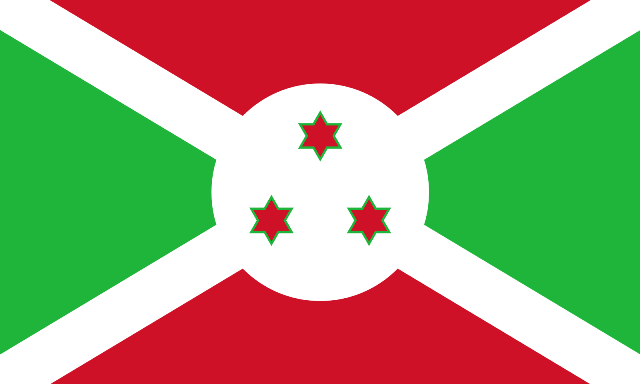Facts about Burundi
Official languages: French, Kirundi
Capital: Bujumbura
Area: 27,830 km²
Population: 9.9 million residents
Population density: 354.41 residents per km²
Currency: BIF
Internet TLD: .bi
ISO codes: BI, BDI, 108
The telephone code for Burundi is +257
Flag of Burundi
The unusual flag of Burundi was adopted on March 28, 1967. Its central motif is a white St. Andrew’s cross and a white circle in the center of the flag. The cross divides the flag into four parts, where the upper and lower fields are red and the left and right fields are green. In addition, there are three six-pointed stars in the white circle, which are said to represent the national motto, which reads: “Unity, Work, Progress.” But they can also symbolize the three main ethnic groups of Burundi, which are the Hutus, the Tutsis and the Pygmies. The color green signifies hope for a better future, while red traditionally commemorates the blood shed during past freedom struggles. The white color of the St. Andrew’s cross symbolizes peace.
Burundi is a state in East Africa. Inland Burundi is one of the smallest states in Africa. It is located south of the equator on the Watershed between the Nile and the Congo. The history is marked by tribal feuds (Hutsi, vs Tuti). As German East Africa and as a Belgian protectorate, it had been ruled by colonialism since 1884 and gained independence in 1962. The unstable situation in the country repeatedly resulted in bloody massacres between the warring tribes, for example in 1972 and 1993. Burundi is one of the poorest countries in the world.
Biggest Cities of Burundi by Population
The largest city in Burundi is the capital city of Bujumbura. Located on the northern shore of Lake Tanganyika, it is home to around 700,000 people and is known for its vibrant nightlife scene as well as its numerous parks and gardens. Bujumbura has a variety of cultural attractions such as museums dedicated to both local history and modern art, as well as several mosques dating back to medieval times. Additionally there are plenty of shopping opportunities with numerous markets selling everything from traditional Burundian food to international luxury items. The city also hosts a variety of festivals throughout the year including International Festival of Dance and Music in July which features traditional music performances, dance performances, food stalls, and more.
The second largest city in Burundi is Gitega located in the center of the country near the border with Rwanda. It is home to around 200,000 people and is known for its vibrant nightlife scene as well as its numerous parks and gardens. Gitega has a variety of cultural attractions such as museums dedicated to both local history and modern art, as well as several mosques dating back to medieval times. Additionally there are plenty of shopping opportunities with numerous markets selling everything from traditional Burundian food to international luxury items. The city also hosts a variety of festivals throughout the year including Festival de Musique et Danse Traditionnelle (FMDT) in October which features traditional music performances, dance performances, food stalls, and more.
| # | City | Population | Latitude | Longitude |
| 1 | Bujumbura, Burundi | 331,811 | -3.3822 | 29.3644 |
| 2 | Muyinga, Burundi | 71,187 | -2.8451 | 30.3414 |
| 3 | Ruyigi, Burundi | 38,569 | -3.47639 | 30.2486 |
| 4 | Gitega, Burundi | 23,278 | -3.4264 | 29.9308 |
| 5 | Ngozi, Burundi | 21,617 | -2.9075 | 29.8306 |
| 6 | Rutana, Burundi | 21,004 | -3.9279 | 29.992 |
| 7 | Bururi, Burundi | 19,851 | -3.94877 | 29.6244 |
| 8 | Makamba, Burundi | 19,753 | -4.1348 | 29.804 |
| 9 | Kayanza, Burundi | 19,554 | -2.9221 | 29.6293 |
| 10 | Muramvya, Burundi | 18,152 | -3.2682 | 29.6079 |
| 11 | Cibitoke, Burundi | 14,331 | -2.8869 | 29.1248 |
| 12 | Bubanza, Burundi | 12,839 | -3.0804 | 29.391 |
| 13 | Karuzi, Burundi | 10,816 | -3.10139 | 30.1628 |
| 14 | Cankuzo, Burundi | 6,696 | -3.2186 | 30.5528 |
| 15 | Kirundo, Burundi | 6,194 | -2.5845 | 30.0959 |
| 16 | Rumonge, Burundi | 6,185 | -3.9736 | 29.4386 |
| 17 | Mwaro, Burundi | 5,035 | -3.51128 | 29.7033 |
Burundi: Gitega
The current capital is called Gitega, it is also the second largest city in the country. It was also the capital of the former kingdom of the same name. It has only been the capital since 2018.
The capital of Burundi used to be called Bujumbura. This city is located on the shores of Lake Tanganyika in the southwest of the country. This is also the administrative center as well as the economic center of the country. The new capital is about 60 kilometers from the old one. It is still the largest city in the country, but just no longer the capital.
